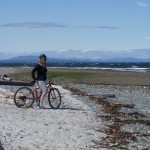Laura Langston's Blog, page 45
July 11, 2013
How Books Opened One Girl’s Mind
Books can bring comfort, open minds, change lives. We’ve heard that before. But even though I write books for a living, I’m sometimes so caught up in the story I’m trying to tell that I don’t think about their potential power. In this wonderful Ted talk, Lisa Bu talks about the important role books have played in her quest for happiness.
http://www.ted.com/talks/lisa_bu_how_books_can_open_your_mind.html
July 3, 2013
What I’m Reading
 I’m dreaming of the beach this month. Most years we’re there by now, staying in a rundown cottage with a million dollar view, and reveling in fresh seafood, long bike rides and excellent books. We missed the reservation window this year, but with a little luck we may get there for a few days in late August. Even if we don’t, I’m at the beach just about every day in my mind. The new book I’m starting is set in a Pacific Northwest beach town. I see the place as a cross between Port Townsend, Washington and Whiterock, B.C. So while I may not be at the beach physically, every morning when I come down to my office, I can almost smell the tang of the salty air and practically see an eagle perched on a nearby tree top.
I’m dreaming of the beach this month. Most years we’re there by now, staying in a rundown cottage with a million dollar view, and reveling in fresh seafood, long bike rides and excellent books. We missed the reservation window this year, but with a little luck we may get there for a few days in late August. Even if we don’t, I’m at the beach just about every day in my mind. The new book I’m starting is set in a Pacific Northwest beach town. I see the place as a cross between Port Townsend, Washington and Whiterock, B.C. So while I may not be at the beach physically, every morning when I come down to my office, I can almost smell the tang of the salty air and practically see an eagle perched on a nearby tree top.
And when I finish for the day, I have some great books waiting for me.
On the Kindle – The Forest of Hands and Teeth by Carrie Ryan
At the Gym – This Is Not The Story You Think It Is by Laura Munson
Beside the Pond – The Possibility of Dogs by Susannah Charleson
June 27, 2013
Weekly Eavesdropping
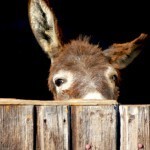 Overheard on a sunny patio on the first day of summer:
Overheard on a sunny patio on the first day of summer:
“Gambling is bad news.”
“It’s only bad news if you lose.”
Teen Freud turned nineteen last week. For those of you who don’t live in Canada, that’s a milestone birthday. Nineteen (eighteen in some places) means you’re an adult and legally allowed to do things like buy alcohol, get married without parental permission, or enter licensed clubs like casinos.
Shortly after I heard that exchange between Teen Freud and his buddy, the two guys tromped inside and informed us they were off to the casino to see what it was all about. When I repeated the admonition that gambling was bad news, Teen Freud laughed and shrugged it off.
I headed out to buy groceries. The boys (they may be nineteen but they’re still boys to me) headed to the casino. When I came home, Mr. Petrol Head was in the kitchen. He looked worried. “Teen Freud called,” he said. “It was the worst possible outcome for his first visit to a casino.”
My stomach sank like a dead turtle. My thoughts immediately went to a worst case place: a fight, a shooting, a fire. The boys had only taken seventy dollars between them. Losing that wasn’t what I’d call a worst possible outcome. It was a most likely outcome. “What happened?”
Mr. Petrol Head looked grave. “He won.”
I should have known. Teen Freud wasn’t just born under a lucky star. He was born on a bed of them, with a star blanket the size of Texas covering him. The kid is lucky. Lucky with a capital L.
“How much?” I asked.
Before he could answer, Teen Freud and his bemused buddy burst through the door. He’d won $430 on a twenty dollar investment. But, he informed us, he didn’t stick around because he was putting $400 of it in the bank. Plus, he was shaking so hard he couldn’t hit the buttons on the slots after that.
Pleased that he was showing some level of responsibility, we went back to putting away the groceries. As the boys headed to the TV room, I heard broke buddy suggest they spend the remaining money on pizza.
“No way,” said Teen Freud. “That money’s going into my vice fund. I’m going back next week.”
June 19, 2013
Pride Gets Me Every Time
 The strawberries are great this year. My patch is lush and green . . . and crowded with berries. Berries that drip sweet juice down your chin when you bite into them; the kind that stain your fingers red. Berries that entice me outside early in morning, while I’m still in my housecoat, to pick for breakfast.
The strawberries are great this year. My patch is lush and green . . . and crowded with berries. Berries that drip sweet juice down your chin when you bite into them; the kind that stain your fingers red. Berries that entice me outside early in morning, while I’m still in my housecoat, to pick for breakfast.
“You must be very proud,” my neighbor called over the fence one morning last week when she saw me bent over the patch.
Her comment made me uncomfortable (and that morning I was dressed so it wasn’t my clothing that made me squirm). It was the word pride. It gets me every time.
Inevitably when I have a book published, someone will say the same thing: ‘you must be very proud.’ And inevitably I cringe.
Pride, according to Oxford, is a feeling of pleasure from one’s own achievements.
I get a lot of pleasure from the strawberries in the garden, from my garden itself. I get a huge amount of pleasure from the books and articles I write too. I’m totally on board with pleasure.
But pride in my own achievements? That sounds a lot like taking ownership. And there’s the catch. In my heart of hearts I truly don’t believe I do anything creative on my own. I can’t will those strawberries into form or make the peonies bloom (though I can and did rescue a pile of long-neglected peony plants and I babied them for a long time before they bloomed again). So I can plant and dig and weed and hope, but something larger than me is in control.
For me it’s the same with writing. I can plot story landscapes and string words together; I can revise and polish, and polish some more. But there’s something much larger than me at play in the creation of a story. I’m not talking about all the people I depend on for help along the way, although those critique partners and editors, cover designers and marketers play a vital role as well. I’m talking about that unseen something many of us creative types tap into when we sit down to work. Call it the Muse or your Inner Voice or the Girls in the Basement. Call it the Kid Who Refuses to Grow Up. Whatever. All I know is that it exists, and it exists independent of me. On a good day, I touch it. On a great day, I’m part of it.
And whether I’m growing strawberries, babying peonies or writing books that makes me feel humble rather than proud.
June 13, 2013
The Walking Read
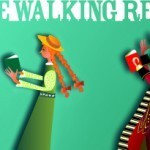 In celebration of their 20th anniversary, CWILL BC is proudly presenting THE WALKING READ, a costume gala benefit for the B.C. Children’s Hospital Foundation.
In celebration of their 20th anniversary, CWILL BC is proudly presenting THE WALKING READ, a costume gala benefit for the B.C. Children’s Hospital Foundation.
Join B.C. children’s authors and illustrators on Friday, June 14 as they celebrate children’s literature and raise money to benefit children. Come dressed as your favorite story character. Enjoy food, drink and a silent auction. Dance to music by Gale Force Blues Band, Nancy Newman Jazz Trio and Xray Ted.
THE WALKING READ:
Friday, June 14, 2013
7 – 11 pm
Open Road Lexus
5631 Parkwood Way
Richmond, BC
For more information on the event itself and how you can get tickets, go here: http://cwillbcevents.wordpress.com/
Check out what children’s Author Yolanda Ridge has to say about the importance of the BC Children’s Hospital Foundation to her life: http://yolandaridge.com/2013/06/11/the-walking-read/
June 6, 2013
Story Planting
 I’m working by the pond whenever I can these days. In between watching the dragonflies flit from lily pad to lily pad I’m finishing copy edits and revisions for Flavor of the Week. I’m also spitting out the first few chapters of a new YA, tentatively titled One Good Deed.
I’m working by the pond whenever I can these days. In between watching the dragonflies flit from lily pad to lily pad I’m finishing copy edits and revisions for Flavor of the Week. I’m also spitting out the first few chapters of a new YA, tentatively titled One Good Deed.
It’s busy, both in the garden and in the office (even the outside one), but that’s typical for this time of year.
As I plant seeds and seedlings in the vegetable bed and story seeds on paper, there’s a sense of anticipation in the air. Harvest may be many months away, but it’s coming. In the meantime, I’m enjoying the work. 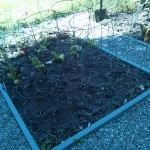
May 28, 2013
Holding Hope in Your Hands
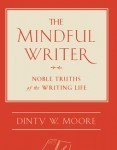 In a bookstore last week, I stumbled across a book I didn’t know I needed: The Mindful Writer ~ Noble Truths of the Writing Life by Dinty W. Moore.
In a bookstore last week, I stumbled across a book I didn’t know I needed: The Mindful Writer ~ Noble Truths of the Writing Life by Dinty W. Moore.
I was away from home, trying to maintain some semblance of a writing life while helping family. It was a precarious juggling act and one with mixed results. There were glimmers of joy (my mother-in-law was improving; I scored some amazing dim sum at an Asian grocery store one afternoon) but there were challenges I couldn’t escape: a concrete hard bed, relentless rain, and – worst of all – a new manuscript that wouldn’t behave.
Never mind behave – the story was only embryonic but it was already on life support. The harder I worked, the less satisfied I became. Pinning this particular story down was like trying to catch a minnow by hand. Slippery, elusive and frustrating.
Before I left for home, I decided to stop at a bookstore and spend some time browsing. I’d probably miss a ferry because of this, and possibly even dinner, but I needed to be surrounded by books. I needed the physical reminder that stories do get started and finished, they do find readers, they do bring pleasure. Surfing an online bookstore wouldn’t cut it. I needed to smell the ink and flip the pages. I needed to hold hope in my hands.
Funny thing, after looking at the first few shelves of fiction – and reminding myself that some of these authors surely struggled at one point in their manuscripts too – I meandered into non-fiction. I checked out metaphysics, biographies, cookbooks, travel. And, as a matter of routine, I glanced at the section on writing. I didn’t expect to find anything (my library of writing books is vast; I don’t need more). But when I saw the title Mindful Writer I pulled it off the shelf.
A friend has been talking to me lately about mindfulness. About breathing. About staying present. About loving detachment. Her advice has concerned life circumstances rather than writing but I don’t believe in coincidences.
I opened the book to the quote on page 33: What crazies we writers are, our heads full of language like buckets of minnows standing in the moonlight on a dock. Hayden Carruth.
In his discourse under the quote, Dinty Moore says that the exact thought we have, the precise phrase or adjective we want, can be just as elusive as that minnow, just as frustrating to catch. We know what we want to say – all we have to do is say it. How hard can it be? Of course, he says, it’s often harder than we’d like it to be, and certainly harder than most non-writers would believe.
In case I needed more, in the intro Moore talks about the power of releasing control of a story, of letting the words and the characters take us in unexpected directions. “The less I grasped at my writing, the more it seemed to expand into areas that surprised and pleased not just me but the reader as well,” Moore says.
Needless to say, I bought the book. The Mindful Writer ~ Noble Truths of the Writing Life by Dinty W. Moore. A collection of thoughts and inspiration for the writer. Or as I like to think of it: hope in my hand.
May 22, 2013
Kindle Love . . . It’s Growing
 It’s gotten off to a slowish start, my relationship with the Kindle. But my affection is growing.
It’s gotten off to a slowish start, my relationship with the Kindle. But my affection is growing.
It’s becoming a habit to tuck the Kindle into my purse when I head out for an appointment now, and I almost always reach for it at night when I crawl into bed. The Kindle is lighter than a hardcover and the backlit screen makes reading easy. Sure, there are things I don’t like and probably never will (the small screen – the very thing that makes it easy to hold – means way less type on the page than I’d like; the lack of page numbers; my impatience when I have to scroll back to find the book title or a particular passage – all things I still find easier to do in an actual book) but the Kindle is working its way into my heart and into my life.
What I’m reading this month:
On the Kindle – A Perfect Evil by E.C. Sheedy
At the Gym – Come Home by Lisa Scottoline
Beside the Tub – Paris, A Love Story by Kati Marton
May 16, 2013
Weekly Eavesdropping Turns up a Winner
 My favorite overheard piece of conversation this week: The problem was I couldn’t get past his nostrils.
My favorite overheard piece of conversation this week: The problem was I couldn’t get past his nostrils.
I’m not making this up. That’s what person one said to person two. The two people in question probably didn’t know I was eavesdropping. If they did, I doubt they would have cared. What kind of nostrils did he have, you ask?
The better question is who said this anyway?
What if it was a doctor trying to explain to a parent why he couldn’t get past the nostril to get at the piece of Lego jammed into their son’s nasal passage? Or a zoo maintenance guy explaining to his boss why he hadn’t treated the giraffe’s ear infection yet? Or a casting director telling the producer why he passed on the guy who nailed the reading but chose the guy having a bad hair day instead?
But no. It wasn’t anything quite so dramatic. It was – you guessed it – two women rehashing the details of last night’s date over a cup of coffee. She couldn’t get past his nostrils. She wasn’t going out with him again, end of story.
I guess they were . . . you know . . . seriously bad nostrils. Or else she’s seriously picky. But as her friend told her, “you can’t judge all guys by their noses.” And then she suggested, “You need to get out there and try harder.”
She might want to get on that. Good men can be hard to find. Especially when you’re eighty-five. 
May 8, 2013
The Steps We Take
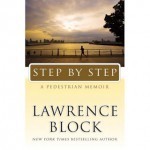 I just finished reading Step by Step, A Pedestrian Memoir, by Lawrence Block. It’s a combination memoir, travel piece and journal of his years as a race walker. I’ve read Block forever (I loved his column in Writer’s Digest). He’s funny and insightful. I expected a great read and I got one. I especially enjoyed his recollection of his unlikely pilgrimage along the Santiago de Compostela in Spain.
I just finished reading Step by Step, A Pedestrian Memoir, by Lawrence Block. It’s a combination memoir, travel piece and journal of his years as a race walker. I’ve read Block forever (I loved his column in Writer’s Digest). He’s funny and insightful. I expected a great read and I got one. I especially enjoyed his recollection of his unlikely pilgrimage along the Santiago de Compostela in Spain.
As I read the book I was reminded again of that link between creativity and movement, especially walking. Author Brenda Ueland regularly walked up to 9 miles a day (she was a prolific writer and she lived to be a healthy 93). Thoreau would ramble for miles through the forest every day too. Author Barbara Samuel titled her blog after her love of walking (A Writer Afoot:http://www.barbarasamuel.com/barbarasblog and she has spoken often of how important a regular walking habit is to her writing practice.
I walk several times a day with Team Sheltie, often with my partner or my son. It’s never a race walk. Depending on the friskiness of the dogs, it’s sometimes more of an amble. But it becomes a time for sharing confidences, or working through a story problem or hatching plans for the future. Or maybe simply a time to enjoy the changing seasons: the smell of lilacs in spring, wood smoke infused air in fall.
Author Julia Cameron calls walking a potent form of prayer. She says it leads us, a step at a time, and gives us a gentle path. Walking leads me, a step at a time, into my own creativity. Not every day perhaps, but often enough to keep me going back for more.

